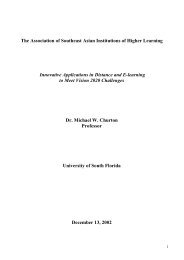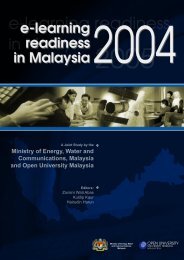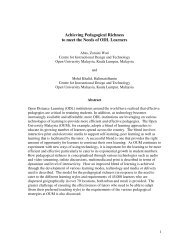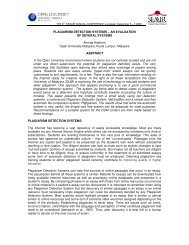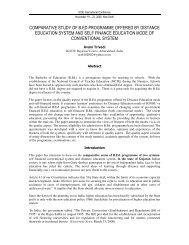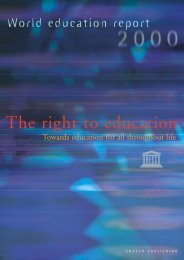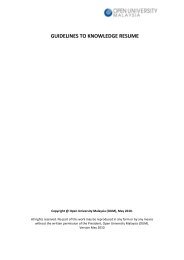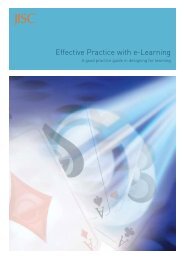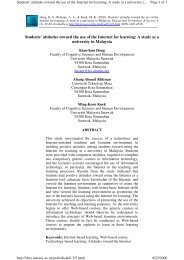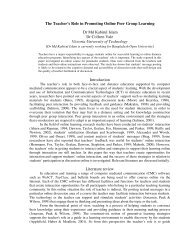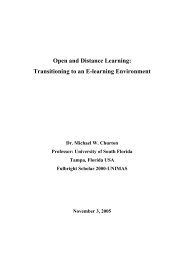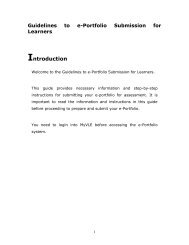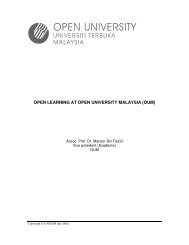<strong>education</strong>al legislation <strong>and</strong> decides on the overall lines of <strong>education</strong> <strong>and</strong> research policy.Performance management <strong>and</strong> target outcomes constitute the most important tool for theMinistry of Education in steering the operations of the universities <strong>and</strong> the polytechnics.(Ministry of Education, 2004c)The main policy guidelines <strong>and</strong> development targets are determined at a general level inthe Development Plan for Education <strong>and</strong> Research, which is adopted by the governmentfor a six-year period every four years. The current Development Plan (Ministry ofEducation, 2004a) is based on the <strong>education</strong> <strong>and</strong> science policy objectives set in PrimeMinister Matti Vanhanen’s government programme <strong>and</strong> in the government’s strategydocument. One of the aims of the Development Plan is to make the <strong>education</strong> systemmore flexible with a view to better access to <strong>education</strong> <strong>and</strong> training for the adult labourforce. Adults’ opportunities to take university degrees will be improved by means of<strong>education</strong>al arrangements geared to working adults. People with <strong>higher</strong> <strong>education</strong> degreeswill be offered more opportunities for further <strong>education</strong> appropriate for their situations<strong>and</strong> their prior <strong>learning</strong>. It is intended that adult learners following university courses ofone kind or another will amount to approximately 20 per cent of the whole enrolment.An important part of the adult <strong>education</strong> provision in Finl<strong>and</strong> is covered by the systemof open university instruction, provided by 19 Finnish universities. The system isopen to everyone, regardless of their age or <strong>education</strong>al background. Open university<strong>education</strong> is arranged in co-operation with the subject departments of universities. Itcorresponds to regular degree studies in terms of both objectives <strong>and</strong> requirements. Theopen universities cannot award degrees, but the credits obtained in them are transferable<strong>and</strong> can be counted towards a university degree. The open university system will befurther developed as a track to obtaining a degree. It is estimated that in the year 2008about 3500 of the 5000 entrants in university adult <strong>education</strong> will start in separateMaster’s programmes, 1000 will proceed through the open university track to degreestudies. Openings will additionally be reserved in graduate-entry <strong>education</strong> for some 500students. (Ministry of Education, 2004a)Adult <strong>education</strong> uses virtual <strong>education</strong> arranged by the universities themselves <strong>and</strong> by theFVU <strong>and</strong> develops flexible forms <strong>and</strong> methods of <strong>education</strong> in keeping with the principleof <strong>lifelong</strong> <strong>learning</strong>, understood as all <strong>learning</strong> activity undertaken throughout life withthe aim of enhancing knowledge, skills <strong>and</strong> competences for personal, civic, social <strong>and</strong>/oremployment purposes. The support services of the Virtual University are also availableto university adult <strong>education</strong>. Lifelong learners are often keener on virtual <strong>learning</strong> thanyoung learners because it enables them to study without the limitations of time <strong>and</strong> place.The proportion of virtual teaching is growing, but currently available only in Finnish<strong>and</strong> Swedish. There are no age limits or requirements concerning prior <strong>learning</strong> in openuniversity. Every effort is made to keep the fees charged for open university instructionat a moderate level. There are also special programmes for elderly people in the openuniversity, which go under the name of The University of the Third Age.In university extension <strong>education</strong>, mature students can pursue general, intermediateor advanced studies on courses geared to adults. The extension centres collaborate indeveloping different continuing professional <strong>education</strong> strategies, anticipating external<strong>and</strong> internal needs. Virtual <strong>education</strong> was used in extension <strong>education</strong> before it becameestablished in undergraduate <strong>education</strong>. One of the principles underpinning extension<strong>education</strong> is to nourish <strong>lifelong</strong> <strong>learning</strong> in the universities.A significant trend in Finl<strong>and</strong> is the growth of cross-border <strong>education</strong>, which is expectedto continue. This comprises both face-to-face teaching <strong>and</strong> virtual <strong>education</strong> offered by108
foreign providers. In Finl<strong>and</strong>, the principle of equal opportunity underpins all <strong>education</strong>.The target set in the Development Plan is that by the end of the present decade 8000polytechnic students <strong>and</strong> 6000 university students will annually carry out part of theirdegree studies abroad <strong>and</strong> that a corresponding number of exchange students will studyin Finl<strong>and</strong>. Polytechnics <strong>and</strong> universities are to increase the number of foreign students tothe extent that in 2008 there will be a total of 12,000 foreign degree students in Finl<strong>and</strong>.To this end, the <strong>higher</strong> <strong>education</strong> institutions will arrange foreign-language programmes<strong>and</strong> courses according to their own specific profiles. Virtual <strong>education</strong> will play a majorrole in the provision. (Ministry of Education, 2004a)The second national strategy, Education, Training <strong>and</strong> Research in the InformationSociety 2000−2004, described changes in the Finnish operational environment <strong>and</strong>outlined the overall development of an information society in Finl<strong>and</strong>. It envisioned that“Finnish society will develop <strong>and</strong> utilise the opportunities inherent in [an] informationsociety to improve quality of life, knowledge, international competitiveness <strong>and</strong>interaction in an exemplary, versatile <strong>and</strong> sustainable way”. (Ministry of Education,1999). The implementation plan consists of projects like the Virtual University, theVirtual School, Research <strong>and</strong> Development in Learning Environments, <strong>and</strong> InformationSociety Structures. (Ministry of Education, 2000)The National Information Strategy 2000-2004 has significantly promoted the use ofICT in <strong>education</strong> <strong>and</strong> research. This in turn has generated new dem<strong>and</strong>s for developinginformation security <strong>and</strong> the protection of personal data <strong>and</strong> privacy, enhancing thequality of <strong>and</strong> open access to virtual <strong>education</strong> <strong>and</strong> materials, <strong>and</strong> developing copyrightlegislation to meet the requirements of the information society. These were some of thereasons for updating the strategy by means of a new programme that will support <strong>and</strong>guide future developments in the Ministry of Education sector. The Information SocietyProgramme for Education, Training <strong>and</strong> Research 2004−2006 contains major priorities<strong>and</strong> actions for boosting information society development. (Ministry of Education,2004b)FINNISH VIRTUAL UNIVERSITYTowards the end of the 1990s, the idea of a national Virtual University was raised bytwo stakeholders: the universities themselves <strong>and</strong> the Ministry of Education. At thetime, the discussion began to focus on the globalisation of the <strong>education</strong>al markets <strong>and</strong>on a European <strong>higher</strong> <strong>education</strong> area. The Minister of Education suggested that thecommittee preparing the Information Strategy for Education <strong>and</strong> Research should includea proposal for a virtual university in it. According to the strategy, “A multidisciplinaryvirtual university will be established to produce <strong>and</strong> transmit high-quality <strong>education</strong>alservices <strong>and</strong> facilitate network-oriented research. The network will include the servicesoffered by the virtual open university”. The virtual university was to offer undergraduate,postgraduate, open university <strong>and</strong> continuing professional <strong>education</strong>.In the summer of 1999, an organisation for implementing the strategy was set up; thisincluded a working group on the virtual university. The working group prepared animplementation plan, <strong>and</strong> subsequently a development unit was established in 2000 to coordinatethe start-up of the virtual university in collaboration with universities.According to the implementation plan, the aim of the virtual university was to create ahigh-st<strong>and</strong>ard, internationally recognised virtual university to offer flexible net-based<strong>education</strong>al services as a joint venture between universities, research institutes <strong>and</strong>business enterprises. The aim was also to exp<strong>and</strong> <strong>and</strong> diversify research which supports109
- Page 1 and 2:
PERSPECTIVES ONDISTANCE EDUCATIONLi
- Page 3 and 4:
The Commonwealth of Learning (COL)
- Page 5 and 6:
ACKNOWLEDGEMENTSIn addition to the
- Page 7 and 8:
These are some of the issues that a
- Page 9 and 10:
What are the trends and issues in l
- Page 11 and 12:
of policy implications relating to
- Page 13 and 14:
evince important differences that c
- Page 15 and 16:
inequitable regulations governing t
- Page 17 and 18:
associations and groups of countrie
- Page 19 and 20:
THE CONTRIBUTORChristopher McIntosh
- Page 21 and 22:
INTRODUCTIONIn his 1996 report to U
- Page 23 and 24:
Lastly, our analysis of the situati
- Page 25 and 26:
diploma or similar certificates of
- Page 27 and 28:
force of the undertaking. Here agai
- Page 29 and 30:
RELEVANT INTERNET SITESUNESCO Task
- Page 31 and 32:
Notes1. This phrasing has been used
- Page 33 and 34:
goals (Daniel, 1996). Lifelong lear
- Page 35 and 36:
eported that group activity had red
- Page 37 and 38:
NEW AREAS FOR DISTANCE EDUCATION:WO
- Page 39 and 40:
targets systematically for the use
- Page 41 and 42:
Rausch, A.S. (2003). A case study o
- Page 43 and 44:
correspondence teaching systems tha
- Page 45 and 46:
significant differences between syn
- Page 47 and 48:
In distance flexible- and blended-e
- Page 49 and 50:
STATE-FUNDED DUAL-MODE SYSTEMS ATUN
- Page 51 and 52:
Table 4.2: Fundable elements in dis
- Page 53 and 54:
sciences in 21 countries of the reg
- Page 55 and 56:
How a system is funded depends in p
- Page 57 and 58:
Litto, Fredric M. (2004). Digital l
- Page 59 and 60:
CHAPTER 5LIFELONG LEARNING IN THE A
- Page 61 and 62: education, which was initiated by C
- Page 63 and 64: So the virtual classroom acted as a
- Page 65 and 66: In June 2002, when the course came
- Page 67 and 68: RELEVANT INTERNET SITESFORCIIR proj
- Page 69 and 70: 11. The approximate rate for 1€ w
- Page 71 and 72: The term modern distance education
- Page 73 and 74: the National Networked Consortium f
- Page 75 and 76: important resource for undeveloped
- Page 77 and 78: standards have been proposed for th
- Page 79 and 80: The development of e-learning withi
- Page 81 and 82: RELEVANT INTERNET SITESCCRTVU Onlin
- Page 83 and 84: MoE (2004b) The Notice on Running N
- Page 85 and 86: CHAPTER 7QUALITY ASSURANCE SURVEYOF
- Page 87 and 88: (Paris, France, 28-29 June 2004) in
- Page 89 and 90: Examples of elaborated QA policies:
- Page 91 and 92: plans and produces its conventional
- Page 93 and 94: SHTVU (China)• Teaching• Teachi
- Page 95 and 96: offers its programmes to Turkish ci
- Page 97 and 98: mega universities apply a set of st
- Page 99 and 100: RELEVANT INTERNET SITESThe Commonwe
- Page 101 and 102: 2. QA initiatives or publications b
- Page 103 and 104: assurance of ODL. This DST will be
- Page 105 and 106: Educational Planning has been respo
- Page 107 and 108: A system of weighting of the key qu
- Page 109 and 110: RELEVANT INTERNET SITESHigher Educa
- Page 111: CHAPTER 9THE FINNISH VIRTUAL UNIVER
- Page 115 and 116: to make the best use of new educati
- Page 117 and 118: The foremost task for the Service U
- Page 119 and 120: part of quality management. The aim
- Page 121 and 122: online courses; an educational tech
- Page 123 and 124: polytechnics, research institutions
- Page 125 and 126: CHAPTER 10PROMOTING CROSS-BORDERREC
- Page 127 and 128: The Bologna Declaration was followe
- Page 129 and 130: indicators currently being used for
- Page 131 and 132: the qualification resulting from th
- Page 133 and 134: Table 9.1: Outline of the portfolio
- Page 135 and 136: • Make sure that incoming student
- Page 137 and 138: CHAPTER 11CHARTING THE EVOLUTIONOF
- Page 139 and 140: Another common characteristic was t
- Page 141 and 142: the current capacity of the educati
- Page 143 and 144: conditions for success. Conditions
- Page 145 and 146: Cultural and ethical issues in inte
- Page 147 and 148: the cost and maintenance of learnin
- Page 149 and 150: Research can be a useful tool for c
- Page 151 and 152: REFERENCESBates, A. (1995). Technol
- Page 153 and 154: Twigg, C. (2001). Quality Assurance
- Page 155 and 156: y, for example, entering into partn
- Page 157 and 158: and even greater steps, and the dec



